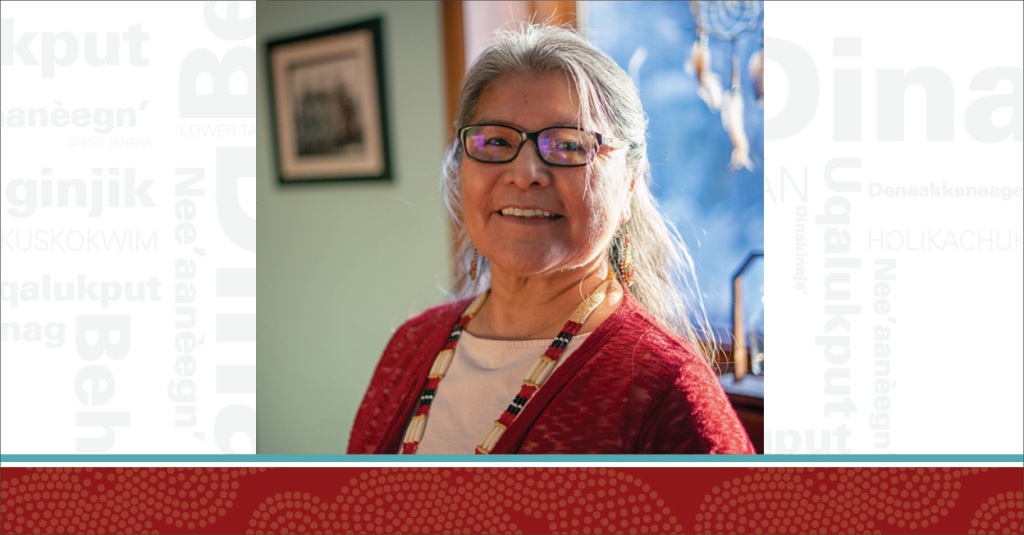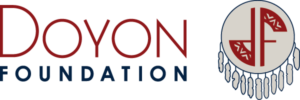
A speaker and instructor of Gwich’in at the University of Alaska Fairbanks (UAF), Hishinlai’ Peter is the daughter of Katherine Peter of Stevens Village and Steven Peter of Arctic Village. Her grandparents are Soozan and Peter Shajol of Arctic Village. Hishinlai’s family includes her husband, Jeff Currey; daughters, Francine Kazenoff and Hannah Sikorski; and four grandchildren.
Hishinlai’ graduated from UAF where she earned a bachelor’s degree in linguistics, a master’s of education in curriculum and instruction, and a doctorate in applied linguistics for her dissertation that explored the relationship between Gwich’in adult language learning and identity development. She lives in Fairbanks.
Hishinlai’ Peter’s commitment to Gwich’in is far reaching: From teaching the language to university students and working on a Gwich’in dictionary, to annotating traditional stories and providing translations for voting materials and to promote public health during the pandemic, Hishinlai’s work demonstrates the ways that language defines a person’s core.
“Language is the root of your identity,” she says. “If you’re interested in learning your language, then begin today. You don’t need a classroom or money. And you don’t need to sound perfect.”
A key figure in her own learning is Lillian Garnett, an Elder from Arctic Village and noted contributor to linguistic materials and story collections published in Gwich’in.
Gwich’in is among Arctic Indigenous languages in the Doyon region that are a focus of revitalization, including a series of online courses offered through Doyon Foundation’s Doyon Languages Online project. In 2019, Hishinlai’ was a member of a Doyon Languages Online team that developed the Foundation’s online language-learning course in Gwich’in. The course is currently available for free to all interested language learners via the Doyon Foundation website.
Hishinlai’ is also a linguist who serves on the advisory board of Tanan Ch’at’oh, the language immersion nest in Fairbanks that enrolled a first group of toddlers 2021.
Hishinlai’ encourages students learning the language to let others know: “Learn how to say in the language, ‘Help me, how do we say….’ Let people know you’re trying.”
“Remember to stay positive,” she adds. “Use the humor that’s inherent in our cultures to learn or teach your language.” She advises students to find others who are at their fluency level and then learn together or to teach what they’ve already mastered.
Her plans include continuing to help children learn the language and developing course materials. When she started teaching at UAF in 2002, language courses were face to face before shifting to online in 2020 because of the virus pandemic. Hishinlai’ at first found it challenging to come up with interactive games to foster language learning. Students eventually worked together through worksheets, and Hishinlai’ developed card games for use in a student’s own environment. She went on to develop activities for teaching other languages, such as Yup’ik or Iñupiaq, that are not in the same language family as Dene.
A hurdle for many students whose first language is English is a tendency to default to English when attempting to speak in another language. Hishinlai’s advice to teachers: Keep speaking to students in the language without falling back on English. “Practice, determination and not being afraid to make mistakes are among the best learning techniques,” she says.
About Doyon Languages Online
Through the Doyon Language Online project, Doyon Foundation is developing introductory online lessons for Benhti Kokhut’ana Kenaga’ (Lower Tanana), Deg Xinag, Denaakk’e (Koyukon), Dihthaad Xt’een Iin Aanděeg’ (Tanacross), Dinak’i (Upper Kuskokwim), Dinjii Zhuh K’yaa (Gwich’in), Hän, Holikachuk and Nee’aanèegn’ (Upper Tanana).
The project officially launched in summer 2019 with the first four courses, now available for free to all interested learners.
Doyon Languages Online is funded by a three-year grant from the Administration for Native Americans (ANA), awarded in 2016, and an additional three-year grant from the Alaska Native Education Program (ANEP), awarded in 2017.
About the Language Champion Profile Series
As Doyon Foundation continues to grow our language revitalization efforts in the Doyon region, we believe it is important to recognize people who are committed to learning and perpetuating their ancestral language. We are pleased to share some of these “language champion” profiles with you.
If you know a language champion, please nominate him or her by contacting our language program director at [email protected]. Language champions may also complete our profile questionnaire here.
You may learn more about our language revitalization program on our website, or sign up to access the free Doyon Languages Online courses here.

Hishinlai’ is a great teacher and friend. Thank you Doyon for sharing Hishinlai’s good words and positivity with us and highlighting her commitment.